- Home
- Michael Dobbs
A Ghost at the Door Page 9
A Ghost at the Door Read online
Page 9
She had tried to talk of Harry while he was driving the several hours to his home but his hand reached out for hers, squeezing it in comfort. ‘No, all that later,’ he instructed and, as ever, she had done as he had asked. Instead, they caught up on old times – so many of them and too old, perhaps, but, with every mile along the motorway and through the winding hedgerows of the country lanes, she felt the years slip away and she was young once more.
As the Mercedes bit into the gravel of the long drive she gazed on the ancient house in awe. His home, set in the cupped hands of the hills behind. It was her first time. She wondered how long it would take her to climb to the highest point, just as she had used to, at home in the hills of Kerry. He left her suitcase sitting on the tiles of his wonderful, echoing hallway. ‘I’ll take it to my room,’ she suggested but he shook his head. ‘No. Later. Eat. Relax.’
She stretched up to kiss him, on the cheek, nervously, and his eyes filled with surprise, just as they had that first time in his rooms at Oxford after she had dropped her blouse and advanced upon him.
‘A glass of champagne before we eat,’ he suggested. It had been sherry back then. But he clicked his fingers in correction. ‘No, of course. Forgive me, Susie. You prefer Pinot Grigio.’ She always had. And the glass was there, with a simple meal not far behind. Smoked salmon. Salad. Prepared by his own hand. She felt sure that a man who lived on his own in a house of this size would have a cook and a housekeeper but there was no sign of either. Of course, he’d sent them away, so she could be alone with him. Private. Intimate. In the wonderful oak-filled library he had created. He gave her his antique New England armchair clad in tobacco leather with its view down to the lake. And whiskey in a thick crystal tumbler.
‘Irish,’ he said.
‘The whiskey or the glass?’
‘Both.’
They had always drunk the same, the whole group. One would decide on the drink of the moment and the rest would follow, even the girls. It had been the sixties, no place for feminine weakness. Drink together, learn together, love together, five young men and three women joined in a conceit and a conspiracy that would last so long as they lived. They hadn’t thought of themselves as pretentious, just better than the rest, sitting around each other’s rooms in college, propped on window seats or in overstuffed armchairs, honing their minds, scraping away convention while their less talented contemporaries got drunk on cheap port and threw up in the corner of the quad. They were an elite, dedicated to intellectual outrage. The drink wasn’t the reason why they had all ended up sleeping with each other but it hadn’t stood in the way, either, oiling the wheels that had taken them along a new and liberating path away from the confines of convention, and in her case from the Catholic Church – or so she had thought. It was only later that, somehow, her upbringing had reclaimed a goodly chunk of her, dragged her back, made her feel guilty. And lonely. Not even the wealth she’d gained could prevent that. Mrs Nun, they called her on the island – or was it Mrs None? But only behind her back. Didn’t stop them accepting her money. Yet sitting here, with him, for the first time in her life she felt that everything could be reconciled.
She raised her glass in silent toast, drank. He was telling her some amusing tale about poor Findlay, one of their group from Oxford, when she began to feel the jetlag kick in. A sudden lethargy made her mind wander. No surprise, at her age. Bone weary, as only old bones can be, but she thought nothing of it, drifting along on the sound of his voice until she realized she wasn’t simply drained but couldn’t move. Beginning to find it difficult to breathe. A stroke, perhaps? But she could feel no pain. And still he was smiling.
It was only then that things began to fit into place. At first she refused to believe. Why he had picked her up at the airport. Brought her here. Dismissed the staff. Not allowed her to be recognized by a single other soul since she’d set foot back in Britain. ‘Why?’ she gasped, but already she knew. ‘Harry . . .’
He remembered – how could he ever forget? – that first time in his rooms overlooking Christ Church meadow when she’d arrived for her tutorial wearing a tight little frown and a still tighter blouse tucked into her waist that didn’t even pretend to hide the body beneath. She’d ‘sported his oak’, locked the outside door behind her as she’d come in so they wouldn’t be disturbed. A stifling day of the Trinity term, the ivy around the old sash window rattling in exhaustion from an unseasonably dry summer that left him sweating inside his woollen suit. He’d asked her if she would like a glass of sherry and she had slipped off the blouse. Desperately earnest, no gentle allure, no foreplay, no real idea. He’d suspected, and later confirmed, that he’d been almost her first.
The sex had been an academic exercise. It was never going to be sustained: he had too much to lose. So, instead, he led her up another path, where they quickly slipped into a sharing of minds rather than bodies, flirted with ideas, fondled fantasies and shared these fantasies with the others in the little group he formed. They shared their bodies, too, although she’d made it clear to him that she slept with the others only because it was what she knew he wanted. Finding oneself through others, he’d called it. Which was precisely what he was doing now.
Killing her was inevitable. The Darwinian conclusion of it all. Survival. His, not hers, of course. She was an irrelevance – a useful irrelevance over the years, he had to admit, but her purpose had long since faded, like her grey, forlorn hair and skin dried by exposure to too much sun, although the eyes were still bright, full of marmalade and chestnuts, those same eyes he remembered looking up at him from the front row of the lecture hall, leaning forward, eager. Even then she’d been just that little bit too enthusiastic, like a sheepdog that followed a step too close. Inevitable she should be trampled.
Like Findlay. He’d killed Fat Finn, too, plied the blancmange of a man with drink to the point of oblivion, then taken him to a point beyond. That had been four months ago and still no one had found the body. In another while the brambles would have overgrown the path and the cottage would disappear
In his mind he’d almost managed to persuade himself he’d done Findlay a favour, put him out of his misery. No fear, no blood. He hadn’t truly killed Findlay at all in one sense, merely hastened the process. But now, with Susannah, this was different. There was no escaping his responsibility as he sat watching the woman die, her eyes twitching, widening in alarm as she began to realize what was happening to her. He was surprised at how calm he felt. He wondered if he would still feel the same in the morning.
CHAPTER EIGHT
Harry had slipped into a world he found impossible to share and it seemed as though Jemma had followed his example. Breakfast had proved desultory; she’d not slept and it showed.
‘What’s next?’ she asked as she watched him make a mess of buttering his toast with his left hand.
‘Help me?’
She did as he asked and with meticulous care, buttering every corner of the toast before covering it with a blanket of her mother’s homemade marmalade. She did it without either complaint or conversation, then pushed the plate in front of him. ‘And?’ she whispered, wanting to know whether he had changed his mind.
‘Try to find Susannah Ranelagh.’
He hadn’t. Harry Jones. Always determined. Driven. And, it was beginning to seem to her, inexcusably selfish.
‘I’ll leave you to it, then,’ she said. Couldn’t butter his own bloody toast yet still he wouldn’t back off. ‘Mustn’t be late for school. Clean up the breakfast things. If you can.’ And, before he could finish chewing, she was gone.
The lake. One of his ancestors had built it, shortly after returning from Waterloo when labour was dirt cheap. Took them almost three years. Two centuries later he knew every bit of bank, every stand of bulrush, every blind spot, and the depth of every reach of the water to the nearest foot. Useful, when you want to dispose of a body.
He stared out from his living room, cup of tea in hand, retracing his footsteps. She’d been lig
ht, almost gaunt after all those lonely years, and even at his age he could still manage a wheelbarrow. It left traces in the dew-damp grass but they would already have disappeared with the rising sun. The spot just along from the willow, with nothing but owls and a foraging vixen as mourners. She was wrapped in a heavy, rusted chain that he’d found in the old stable block, secured with two heavy padlocks, and that had made it hard physical work. He’d almost lost his grip as he’d heaved at the handles of the barrow, but he’d managed; not so much survival of the fittest, he’d thought, not at his age, but at least the most determined. Susannah had cooperated – hadn’t she always? – slipping beneath the dark waters with scarcely a ripple and nothing but a startled moorhen to offer the eulogy. Then it was done.
He thought he’d avoid that spot by the willow for a while. Go about the rest of his business. He had so much still to do. And his tea had already gone cold.
For the next three days Harry and Jemma stumbled around each other, glad of the excuse that it was Harry’s arm and bruised body that kept them from sharing a bed. They didn’t share much else, either; he continued worrying away at things she no longer wanted to know about; he didn’t offer, she didn’t ask. It couldn’t last, something had to give, and it was Jemma who made the first move. She came back from school and discovered him staring at the photograph of Susannah Ranelagh that he’d propped up on the bookshelf in place of the one of his father on the beach. She sighed. It was time to build a few bridges.
‘I like your father’s long hair,’ she suggested, dropping her bag and heading for the bottle of Sauvignon in the fridge.
‘You recognize it’s him?’
‘No mistaking him,’ she said, returning from the kitchen with a generous glass. She waved it in his direction, enquiring if he wanted one himself, but he shook his head. Painkillers. And confusion. She’d spotted his father, done instantly what had taken him hours to figure out. ‘I got trained by the best in British Intelligence to analyse faces but you’re just way ahead,’ he lamented.
‘I’m a woman, Harry. We do faces. We’re a congregation that spends half our lives praying before our mirrors.’
They exchanged a smile, their first in days.
‘Who are the others?’
‘I wish I knew. Susannah Ranelagh’s the one in the middle. As for the rest . . .’
Jemma picked up the photo and studied it. Eight by eleven, or thereabouts. Four men and three women, which made for five strangers. Circular dining table, formal black tie, young faces laughing at the camera, relaxed, casual arms on receptive shoulders, one pair of spectacles slightly askew, the scene awash with alcohol and half-eaten puddings. Friends, probably very close. ‘Early sixties, judging by the awful fashions. Those frills look like they’re designed to throttle the girls and you could hide an army beneath those petticoats. University chums, were they?’
‘Why do you say that?’
‘Pay attention, Jones. You told me your father was at Oxford in the early sixties.’
‘Yes. That’s right.’ He felt sheepish. Now he could see it, of course: the photo screamed of youthful indulgence. So his father and Susannah Ranelagh went back that far . . . Damn, he needed to sharpen up. Shove the painkillers. ‘I’ll have that glass of wine after all,’ he said.
‘So?’ she said as she handed over his drink.
‘Indulge me in this. Please, Jem?’
‘I’ve got schoolwork to prepare,’ she responded, heading off to the bedroom. At least she hadn’t thrown it back in his face.
The wine seemed to mark a turning point in Harry’s recovery. The painkillers went in the bin and with them the dullness that seemed to have filled his mind with fog. Harry began making calls. The first was to Cecil Pisani, a Cabinet minister when Harry had first entered Parliament and who was now in graceful semi-retirement as an emeritus professor at Johnnie’s old college. He readily returned Harry’s call and extended an invitation to dinner on the college’s sumptuous High Table. ‘You’ll have to bear with me, Cecil,’ Harry pleaded. ‘I’m afraid I’m a bit crocked.’
‘The entire wretched country is crocked, old boy,’ Sir Cecil Pisani replied in the comic patrician accent that had probably cost him any preferment higher than Culture Secretary. ‘Better do some damage to what’s left of the college cellar before we have to sell it to the Chinese.’
He tried to make a call to the photographer whose details were printed on the back of the image, only to discover that the telephone number was no longer valid. The company had long gone out of business but it had been taken over by another Oxford photographic firm who understood the value locked up in old images. ‘We don’t throw nothing away, Mr Jones,’ the helpful young woman on the other end of the phone told him. ‘Trouble is, all that old stuff arrived on the back of a truck and got dumped in our warehouse. Photos, negatives, unpaid bills. Quite a few rats, too. All jumbled up, and for a while the rats were winning. I tell you, trying to find anything in that warehouse is like going down a coal mine without a lamp.’
Yet she promised to try. Harry gave her the reference number on the back of the photo and waited. At the very end of the week she called back. ‘I’ve got something, not much. Are you ready?’ she asked. ‘Hilary term 1964, it was. Can’t tell you more, no names or nothing, except there’s a scribbled note on the negative sleeve that suggests they were members of the university’s Junior Croquet Club. Does that ring any bells?’
His father indulging in the genteel summer sport of croquet? Pimm’s among the petunias? About as likely as a tax rebate. His father had always embraced any excuse for a drink but this connection seemed farfetched, although he suspected it might have suited Miss Ranelagh down to her cotton socks.
Harry had less success when he tried to call Tallon, his father’s lawyer. He left a telephone message with his secretary asking him to return his call urgently. He got a text message from him in reply, explaining he was away from London. Harry texted him back asking if he’d ever heard of Susannah Ranelagh. Simple. Yes or no. He was to hear nothing for a week; eventually he got a curt message stating there was no mention of any Susannah Ranelagh in his father’s papers.
He had to track her down, yet she remained obstinately elusive. She had arrived at Heathrow. And she had vanished. Harry had an extraordinarily wide circle of friends from his days in the Army and at Westminster and he began putting them to use. He spoke to retired policemen, old Army chums now working in the private security field; he even spoke to a couple of investigative journalists who owed him a favour and asked them to help trace her whereabouts. It all came to nothing, so he made one last call.
‘Very formally, Harry, old chap, I have to tell you to go screw yourself.’ The lilting Welsh tones of Detective Chief Inspector Hughie Edwards travelled down the phone. ‘Good God, man, you know the Metropolitan Police can’t go peddling information like that. Right to privacy and all that bollocks. And you should know: it was your lot what passed the bloody legislation.’
Harry sighed. No one was willing to take the risk, not after the phone-hacking scandal had taken down an ill-assorted collection of journalists, policemen and private investigators, leaving politicians who had stood too close covered in all sorts of collateral shit.
‘But you know all that,’ the Welshman sighed, ‘so I have the sneaking suspicion that this is important to you.’
‘Very. She may have tried to kill me.’
‘Then make an official complaint.’
‘It was in Bermuda.’
‘Ah. I see.’ The Welshman sucked his teeth. ‘Then all I can suggest is that the next time someone tries to kill you, you arrange for it to happen on my patch. Then I can be of some assistance, you see. But for now, old chap, you’re buggered.’ More sucking of teeth. ‘So, having got all that official cobblers out of the way, isn’t it about time we caught up with each other, you and me? Been a while, hasn’t it? Why don’t you buy me a drink tomorrow? About midday? Red Lion? And don’t be bloody late.’
; The Red Lion pub is something of a Westminster institution. Sandwiched between Parliament and Downing Street, it claims to have served beer to every prime minister for more than five hundred years right up to Edward Heath, who refused to enter the place. It was one of many fine old traditions the curmudgeonly Heath broke. Yet the Red Lion survived with its reputation intact, which was rather more than could be said for its antagonist. Harry was a few minutes early, lingering outside its black-gloss door, when he spotted a former colleague, an ambitious backbench politician, one of the upwardly servile who had survived the last election cull and whose ear was now firmly screwed to his phone. He was walking towards the pub and gazing quizzically at Harry, as though chasing a faint memory. He almost stopped, then suddenly quickened his step and scurried by.
At least the policeman recognized him, just. His arm was still clad in its sling and plaster cast, his face still scarred. ‘Sweet Jesus, Harry, who did that to you?’ the man blurted out as he took in the signs of disaster. ‘No, don’t tell me, not that little old lady of yours in Bermuda?’ Edwards began laughing. ‘The entire Iraqi Republican Guard couldn’t nail that ugly arse of yours, and now this.’
‘Fell off my bike,’ Harry replied doggedly.
‘You’re slowing down.’
‘Thanks. Makes me feel so much better.’
And again Edwards laughed. ‘I’ll buy the drinks. Looks like I’ll bloody well have to carry them, too. You wait here, we’ll drink outside.’ And soon he had returned with two froth-spilling pints. Edwards was in his civvies, a man a few years older than Harry and of considerably bigger girth, front-row stock, with a large broken nose, stormy eyes and two Cox’s pippins for cheeks. ‘Still, look on the bright side,’ he said, setting Harry’s drink down on the brass windowsill. ‘At least you’re safe for now.’
‘Meaning?’ Harry said, sipping clumsily. He’d bitten deep into his lip during the accident and it was swollen and sore.

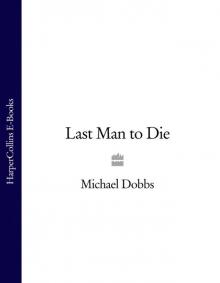 Last Man to Die
Last Man to Die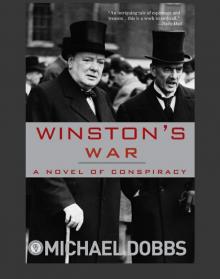 Winston's War
Winston's War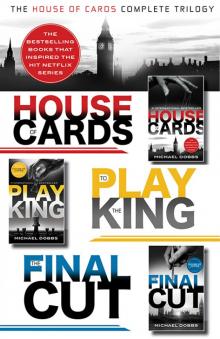 The House of Cards Complete Trilogy
The House of Cards Complete Trilogy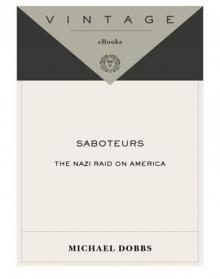 Saboteurs
Saboteurs The Touch of Innocents
The Touch of Innocents WC02 - Never Surrender
WC02 - Never Surrender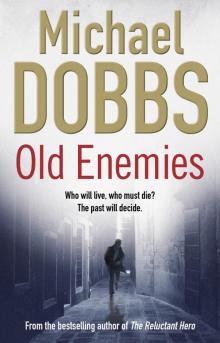 Old Enemies
Old Enemies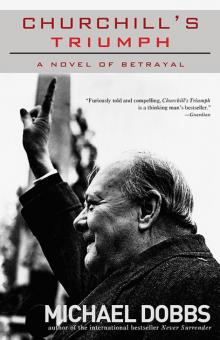 Churchill's Triumph
Churchill's Triumph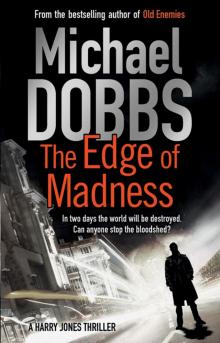 The Edge of Madness
The Edge of Madness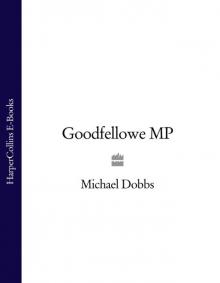 Goodfellowe MP
Goodfellowe MP The Final Cut
The Final Cut Whispers of Betrayal
Whispers of Betrayal Churchill's Hour
Churchill's Hour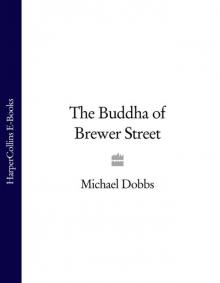 The Buddha of Brewer Street
The Buddha of Brewer Street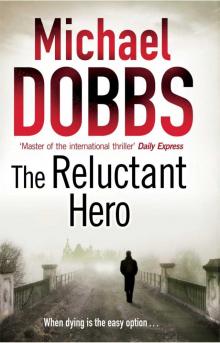 The Reluctant Hero
The Reluctant Hero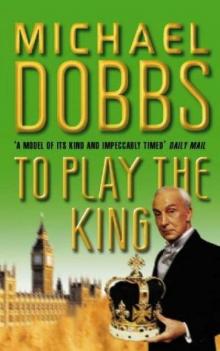 To Play the King
To Play the King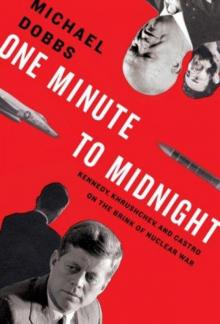 One minute to midnight
One minute to midnight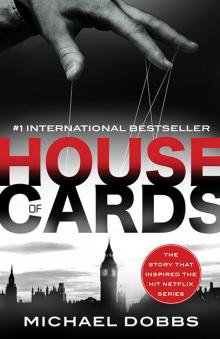 House of Cards
House of Cards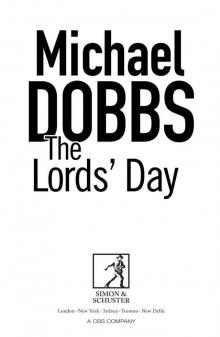 The Lords' Day (retail)
The Lords' Day (retail)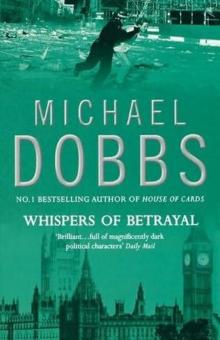 Whispers of betrayal tg-3
Whispers of betrayal tg-3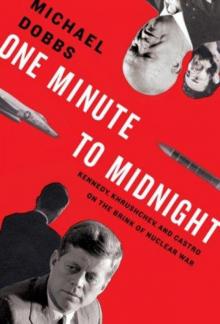 One minute to midnight: Kennedy, Khrushchev, and Castro on the brink of nuclear war
One minute to midnight: Kennedy, Khrushchev, and Castro on the brink of nuclear war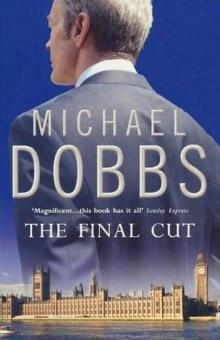 The Final Cut fu-3
The Final Cut fu-3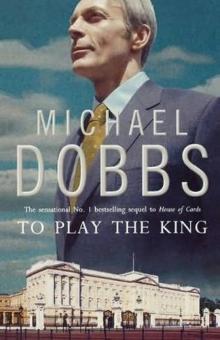 To play the king fu-2
To play the king fu-2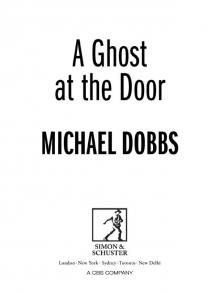 A Ghost at the Door
A Ghost at the Door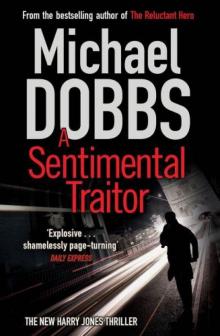 A Sentimental Traitor
A Sentimental Traitor